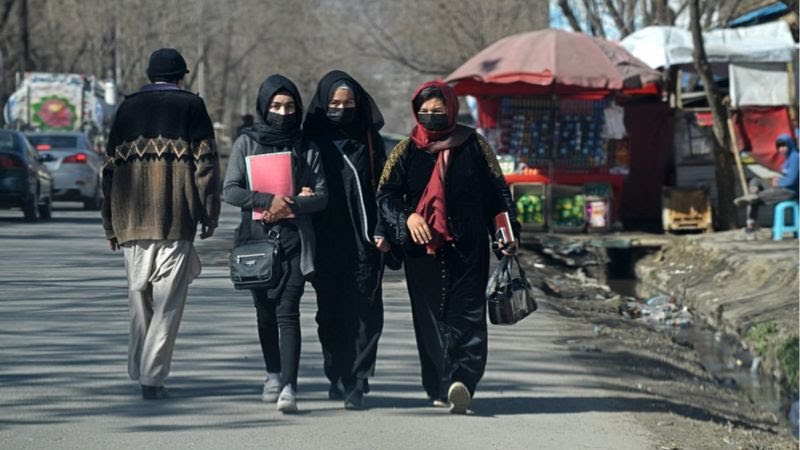Afghanistan’s Taliban-imposed prohibition on women attending universities has sparked international outrage. And left many Afghans feeling hopeless.
Since girls have already been kept out of secondary schools. Since the Taliban returned last year, the prohibition significantly restricts women’s access to education.
Afghanistan Women’s Unity and Solidarity protesters said, “Today we come out on the streets of Kabul to express our voices against the closing of the girls’ universities. Taliban officials promptly put an end to the tiny protests.
Female pupils have expressed their suffering to the BBC. One student at Kabul University remarked, “They demolished the one bridge that could have connected me with my future.”
The decree, which returns Afghanistan to the time under the Taliban’s initial rule when girls could not enrol in formal education. Has drawn condemnation from the UN and a number of other nations.
It was “a new low further breaching the right to equal education and deepens the erasing of women from Afghan society.” According to the UN’s Special Rapporteur on Afghanistan. A such action would “had implications for the Taliban,” according to the US.
Secretary of State Antony Blinken said in a statement that the Taliban “cannot expect to be a genuine member of the international community unless they respect the rights of everybody in Afghanistan.”
The Taliban have been under pressure from Western nations to boost female education all year. If they want to be legitimately recognised as the government of Afghanistan.
Although he was “disappointed” by the Taliban’s decision, Pakistan’s neighbouring foreign minister said he still supported engagement.
After taking over last year in the wake of the US pulling out of the nation. The Taliban had pledged a softer administration. However, the nation’s women’s rights and liberties have continued to be reduced by radical Islamists.
Hibatullah Akhundzada, the Taliban leader, and his inner circle have been opposed to modern education, especially for girls and women.
More moderate officials have voiced resistance to this attitude. And observers claim that this matter has been a source of interfamilial conflict throughout the year.
However, the education ministry announced on Tuesday. That after a review of the university’s curriculum and environment, girls’ enrollment would be prohibited “until a proper environment” was established.
It continued, saying “citizens shouldn’t be concerned” and that it would soon create such a setting.
However, the Taliban in March had pledged to reopen a few high schools for girls. But on the day of their return, they abandoned the plan.
The crackdown also comes in the wake of a string of recent changes to laws affecting women. In the capital’s parks, gyms, and public baths, women were prohibited in November.
According to a university instructor and Afghan activist in the US, the Taliban’s suspension of women’s access to higher education brought an end to their isolation.
It has been clear from interactions with Taliban commanders over the past year that there is division among the Taliban on the subject of girls’ education.
Several Taliban members have stated repeatedly that they are hopeful and trying to try and ensure that girls receive an education off-the-record.
In 31 of Afghanistan’s 34 provinces, girls are now permitted to take secondary school graduation examinations. Despite the fact that they have been prohibited from attending school for more than a year.
That offered a spark of optimism, which has now been put out.
















